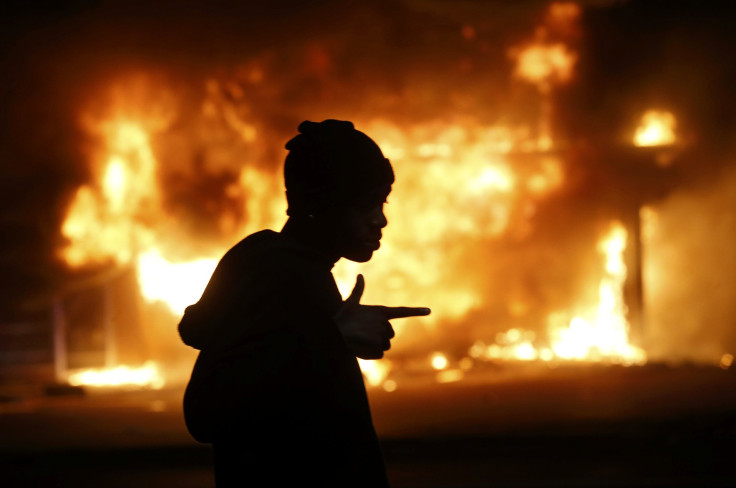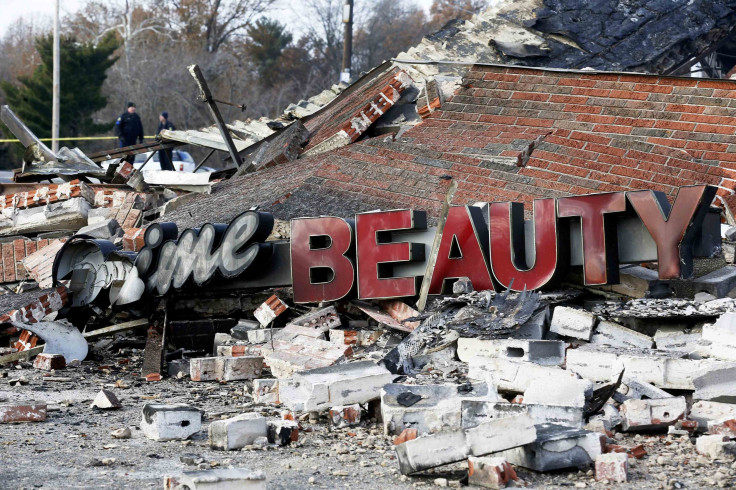Ferguson Unrest: How Media Consumption May Have Influenced Violence After Officer Darren Wilson's Non-Indictment

Even as Thanksgiving beckons, the violent sights, sounds, and scenes from a night of rioting in Ferguson, Mo., linger in memories across the nation and around the world. For most of us, news and reports of this national tragedy unfolded not on our familiar streets but on our TV screens, our cell phones, and the pages of social media.
And so we watched, either on a large screen TV or a laptop, video footage of crowds throwing bricks at police and setting patrol cars on fire in the battle-weary St. Louis suburb. In shock, we observed reporters being hit by hurled stones and running from smoke during what should have been a peaceful demonstration to protest the decision of a grand jury which had chosen not to indict a white police officer, Darren Wilson, for the Aug. 9 death of Michael Brown, an unarmed 18-year-old black man. As police fired rounds of tear gas and bean bags directly into the crowd, we perused the reactions of our friends on Facebook and gleaned more information on Twitter about locals burning down buildings and looting stores.
Whether today we feel upset, excited, angry, horrified, or anguished — whether or not issues of justice are foremost in our minds — many of us wonder about the influence of the media. Did the media play a role in inciting this riot?
Since the media have long encouraged violence, destruction, some might say, is its natural consequence.

“The effects of media are cumulative and subtle and insidious and occur over a long period of time,” said Dr. Victor C. Strasburger, an expert on children and media at University of New Mexico School of Medicine. He believes media, which “have become kind of electronic parents,” are “one of the most powerful influences on children and teens that we know of… and unfortunately underappreciated” by most everyone. (In fact, most of us overestimate the effects of mass communication on everyone else while underestimating its possible effect on ourselves.)
More to the point, Strasburger supports the idea that the media creates “a mean and scary world.” Here, he is referring to an idea of George Gerbner, who coined the term “mean world syndrome” to describe how people who watch large amounts of TV are more likely to believe the world is a dangerous and frightening place. “People over-estimate their risk of being mugged and killed,” Strasburger explained. “And people think violence is an acceptable solution” for resolving conflicts. The mean world syndrome, then, would certainly help to explain the tendency to turn a demonstration into the mob violence seen in Ferguson.
“There are media effects here — clearly we’ve become a more violent society,” Strasburger says to Medical Daily. “And I think police are scared out of their wits that someone will pull a gun on them.”
What the Studies Say
In a recently published paper, he demonstrates the ways media can instil violence. He and his co-authors noted how “the average adolescent will have seen an estimated 200,000 acts of violence on television alone,” by age 18. Meanwhile antisocial beliefs and behavior also are encouraged by interactive media like video games because of the violence they contain. In particular, professionals worry about games featuring first-person shooters. Chillingly, Strasburger and his co-authors evoke Michael Carneal, who shot eight teenagers during their morning prayer circle meeting in 1997.
“In the aftermath of the West Paducah, Ky., school shooting, it was discovered that the shooter had never fired a real gun in his life before that day, yet his marksmanship was both accurate and lethal,” the co-authors wrote. Further, exposure to media violence can lead to anxiety, fear, and desensitization, resulting in increases of aggression and decreases of altruism. Meanwhile, how many teens play games or watch hours of violent TV alone in their bedrooms?
Today we face the additional effects of the customized media we’ve begun to create. Though media can never tell us what to think, it tells us what to think about... all the time. And now, not only do we interact with so-called mass media, but we also tailor our interactions with and information about the world through social media and other selective channels.
“You can get a very skewed view [of the world],” Strasburger tells Medical Daily. “And we don’t know a lot about how people process the content they see on the Internet.” While he supposes people might only “search for and like the content they agree with,” it also might be possible that they learn from alternative points of view. The point is, nobody knows really what effects new media are having.

Media Dependency
“We have a handful of studies on new media and they’re mostly on cyberbullying and sexting,” said Strasburger, who noted that the last time the National Institute of Mental Health issued a report on the impact of media on children and adolescents was in 1982, “before the Internet and cell phones. We desperately need money on how newer media affect people, not just older media.”
Going forward, he recommends parents not allow little children to watch the news, while teens might co-view the news with their parents who can use Ferguson — or any of the upcoming planned demonstrations — as an opportunity to discuss violence and racism and justice. In short, media can provide parents with valuable teachable moments.
In such a manner, Strasburger believes, some good can come of this national tragedy. However, his point remains: If a Super Bowl ad costs $4 million for 30 seconds, then wealthy advertisers believe even a small splash of media time is capable of swaying behavior. Why, then, would we vastly underestimate the long-term effects of a dependency — don't forget your electronic parent, especially when you're feeling confused — that began in our earliest childhood? It is simply “unbelieveable,” according to Strasburger, “that people don’t appreciate how powerful the media can be.”
Published by Medicaldaily.com



























